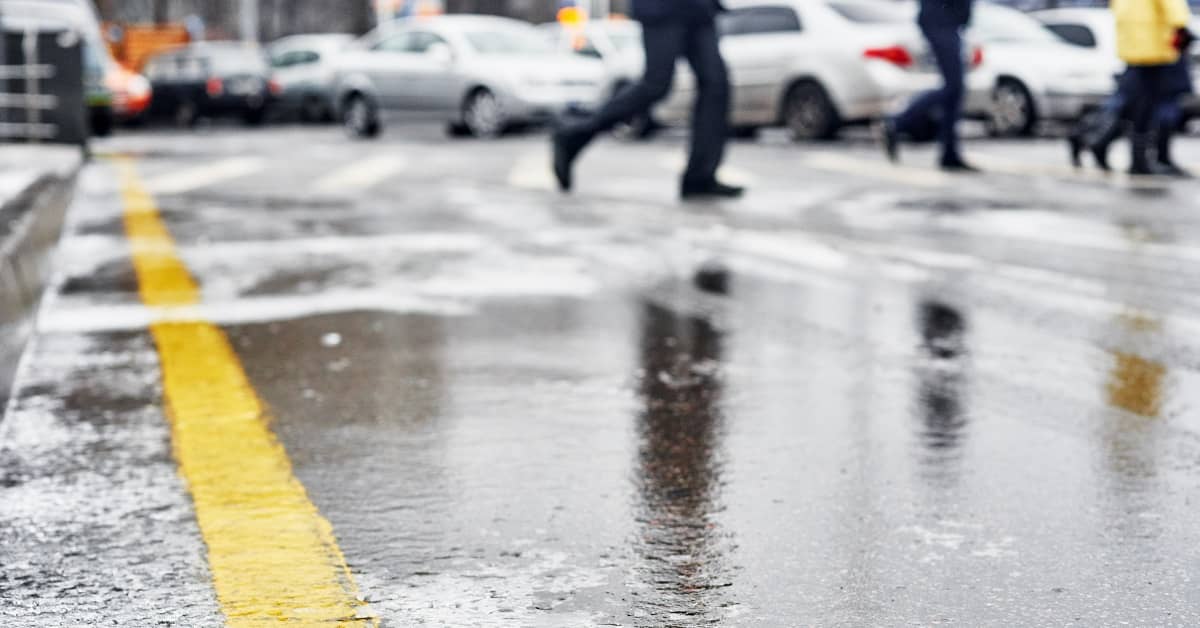
Wisconsin winters are a mixed blessing. On the one hand, snowfall transforms the landscape into a wonderland perfect for ice skating, sledding, skiing, and many other activities. On the other hand, the accumulation of snow and ice can make walkways, parking lots, and roads extremely hazardous.
If you slip on ice or snow in the winter, you may assume that the injuries you sustain in a fall are the result of your own carelessness. However, this may not be the case, nor does it take into account the other circumstances when you can file a claim for a slip and fall accident.
The Wisconsin slip and fall accident lawyers at Studinski Law, LLC have extensive experience handling claims involving dangerous properties. Please call (715) 343-2850 today for a free case evaluation. Our attorneys serve clients Plover, Marshfield, and surrounding areas of Wisconsin.
In Wisconsin, it is the responsibility of property owners and occupants to remove snow and ice from public walkways within a reasonable amount of time after snowfall or the development of icy conditions. However, the timing of these obligations for owners and occupants varies by community.
For example, cities such as Wausau, Stevens Point, Wisconsin Rapids, and Waupaca require the removal of snow and ice from sidewalks within 24 hours of snowfall. Other communities such as Marshfield, meanwhile, allow 48 hours for snow and ice to be removed.
Local snow removal laws may affect your slip and fall accident claim. If you slip and fall on snowy or icy premises within 1 hour of snowfall, the liability of the owner or occupant may be less certain than if the accident occurred 24 or 48 hours after it stormed.
Comparative negligence is often a factor in premises liability claims. The property owner or occupant may be liable for a dangerous condition on the premises, but the claimant is also responsible for exercising caution in navigating an apparent hazard (such as a sidewalk recently made slippery by ice and snow). An experienced attorney can discuss your legal options and how your share of the fault for the accident may affect your ability to recover compensation.
Of course, an icy or snow-packed sidewalk is not the only place where serious falls can happen. Many slip and fall accidents occur indoors due to hazards such as a wet floor, debris in walkways, cracked tiles and steps, rips and humps in carpet, insufficient lighting, and other conditions. Outdoor accidents may involve breaks in pavement or asphalt, standing water, objects on the ground, and more.
These dangers are most common on highly trafficked premises, such as commercial and government buildings, but they can also arise on residential properties. In these circumstances, the liability of the property owner or occupant rests primarily on two questions:
If the answer to both of these questions is “Yes,” you may be entitled to compensation for the injuries you sustained and the damages you incurred in a slip and fall accident.
Like other personal injury claims, slip and fall accidents are subject to a statute of limitations that defines how long you have to bring a claim. By law, you have 3 years to take legal action.
This might sound like a long time, but don’t be fooled: The clock starts ticking immediately on your case.
If you wait, crucial evidence may be lost, dangerous conditions may be cleaned up or repaired, and witness memories may fade. If the slip and fall accident occurred on a government property, you must provide notice of your intent to sue within just 120 days (approximately 4 months).
Slip and fall accidents and other premises liability claims may seem straightforward. However, a variety of factors can make these cases more complicated.
It is important to be aware of the following when bringing a slip and fall claim:
In cases involving both residential and commercial properties, the party that owns the property may not be the same as the party that occupies the property. For example, a business may rent a commercial space from a property management company, or a tenant may rent a home from a homeowner or landlord.
Tenants and other occupants are generally responsible for the safety of the premises. It is important to identify who is responsible for conditions on the property so you can pursue a claim or lawsuit against the correct party.
Wisconsin has adopted a modified comparative negligence rule in determining the rights of injury victims to recover compensation after an accident. The comparative negligence statute reads in part:
“Contributory negligence does not bar recovery in an action by any person or the person’s legal representative to recover damages for negligence … if that negligence was not greater than the negligence of the person against whom recovery is sought, but any damages allowed shall be diminished in the proportion to the amount of negligence attributed to the person recovering.”
In plain English and as it applies to slip and fall accidents, claimants may recover compensation as long as their negligence is less than that of the party or parties responsible for the premises.
With this in mind, it is important to recognize that your own conduct leading up to the slip and fall will be closely scrutinized by the property owner and/or the insurance company. Your financial recovery may be reduced or even barred if you were distracted while walking on the premises, if you ignored warning signs, or if you engaged in other careless behavior that contributed to the accident.
In most slip and fall accident claims, you are taking action against the insurance carrier for the owner of the property. No insurer wants to pay out money, so adjusters and attorneys for the company will likely employ a number of tactics to limit (if not outright deny) your compensation.
A representative for the insurance company may try to contact you and ask for a statement. You may receive a request to release your medical records. You are under no obligation to comply with these requests, or even to speak with the property owner’s insurer.
Instead, it is in your interest to contact a Wisconsin slip and fall accident lawyer as soon as possible for assistance with your case.
Your attorney will investigate the accident to determine how the slip and fall occurred and who is at fault, calculate the damages in your case, negotiate on your behalf with the insurance company, and take your case to trial if the situation calls for such a step.
Studinski Law, LLC is committed to taking the burden from our clients so they can focus on getting better. We are thorough and tireless in our efforts to build your case and recover the fair compensation you need to move ahead with your life.
If you have been injured in a slip and fall accident, please call (715) 343-2850 today for a free case review. Our slip and fall lawyers serve clients throughout Wisconsin, including Marshfield, Plover, and other nearby areas.
